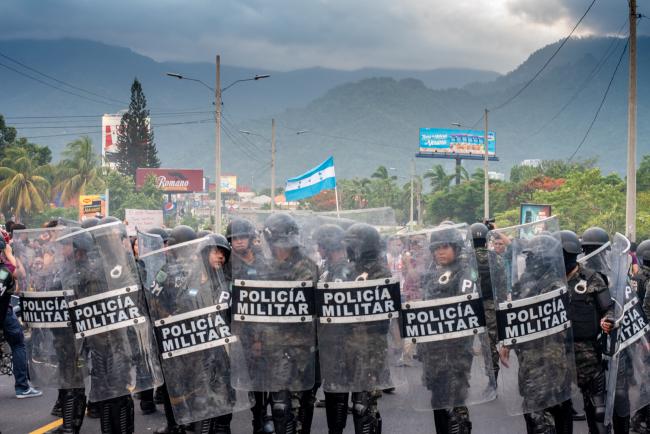
NACLA is launching a summer fundraising campaign. Click here to show your support.
Manuel Zelaya, Honduras’s ousted ex-President, eased into the couch in the headquarters for his LIBRE party and laid out the opposition’s mounting insurrection.
This summer marked 10 years since Zelaya was overthrown in a U.S.-backed military coup. The decade since has transformed Honduras, exacerbating the Central American nation’s preexisting social problems by turning it into one of the poorest, most violent places in the hemisphere. Since the coup, a junta of right-wing, billionaire drug traffickers has slipped into political power—including President Juan Orlando Hernández, who U.S. prosecutors recently accused of complicity in a drug money scheme to illegally fund his 2013 presidential campaign.
“Ever since 2009, when they got rid of me,” Zelaya said, “an authoritarian military regime was installed that centralized power, sacked the [government’s] institutions and indebted the country to remain in power. The regime only represents the interests of transnational corporations. And as long as [Hernández] serves them, the United States is going to continue supporting him, regardless of the accusations.”
On August 9, Zelaya and his left-opposition LIBRE party organized a demonstration in Tegucigalpa’s Parque Central to demand the immediate resignation of Juan Orlando Hernández (or “JOH,” as he’s commonly known). But the battle LIBRE waged this summer wasn’t only in the streets. It’s also in the National Congress, through a proposed “electoral reform” designed to fix a democracy many believe has been corrupted beyond repair.
“The electoral reform is an instrument for elections,” Zelaya said. “And because the [current] regime refuses to do it, we’re going on in an insurrection, which is a peaceful but active protest, in the streets and the Congress.”
The electoral reform consists of the creation of two main bodies, the Tribunal Electoral Justice and the National Electoral Council. Carrying 44 representatives from each main party, they would oversee the next election cycle. This could potentially augur radical change in the electoral processes in Honduras, as the two proposed bodies would entirely replace the TSE (Tribunal Suprema Electoral, or Supreme Electoral Tribunal), the judicial body which became notorious for legitimizing the fraudulent elections in 2013 and 2017.
For many members of the opposition, the hope for a democratic defeat of JOH is juxtaposed with the cynicism the last 10 years have corrupted Honduran democracy beyond the point of repair.
“The truth is that no state institution is functioning as it should—none. Not even the Congress in which we work. Because it’s corrupted, because narcotraffickers have penetrated the majority of state institutions,” said Lenín Laínez, a congressman for LIBRE. “The legislative insurrection that we’re waging in the national congress is precisely for that.”
Zelaya and LIBRE compose only one part of a wide-ranging, fractured opposition movement though. That opposition remains divided over their post-JOH vision for the country. Opposition leaders like Zelaya have also faced criticisms for being mere manipulators of electoral politics rather than consistent fighters for social justice. Even so, one thing unites the opposition: The country can no longer wait for the 2020 election to get rid of the president.
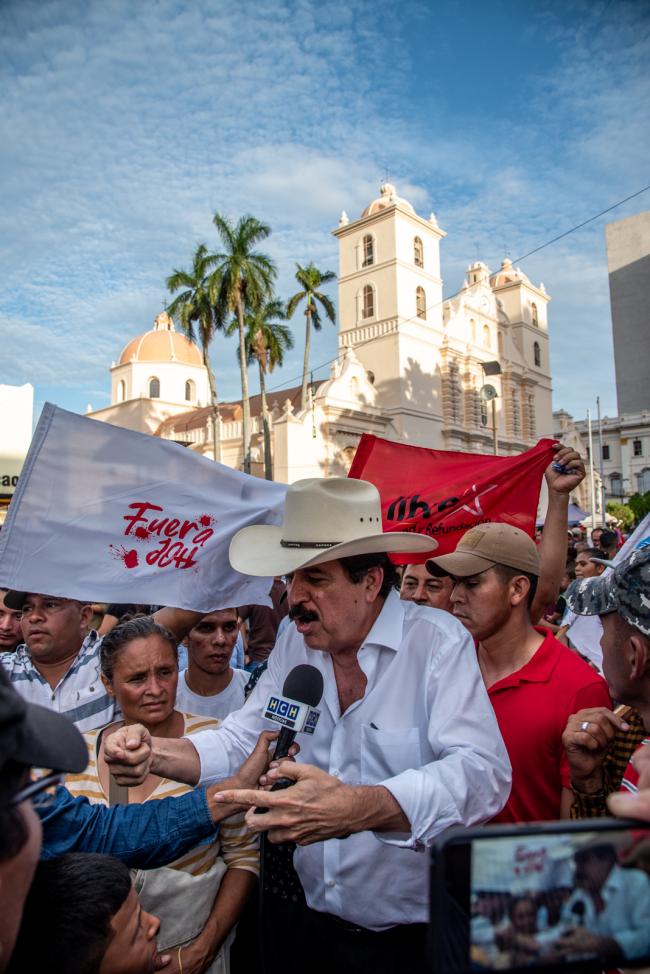
The Battle Against Privatization
For many Hondurans, the boiling point after ten years of “narco-dictatorship” came with Hernández’s latest proposal for privatizations.
In late April, Hernández announced a sweeping plan to privatize Honduras’s public health and education systems, while the government simultaneously agreed to a $311 million loan from the International Monetary Fund (IMF).
Rage accumulated over years of frustration with Hernández’s governance transformed the anger over privatization plans into an all-out demand for the president’s resignation. Health workers took to the streets alongside teachers to protest the proposal, where they were joined by a broad range of students and environmental, LGBTQ+, and Indigenous rights activists. The protests came just years after a $300 million corruption scandal in the dilapidated public health system took thousands to the streets for weeks in 2015 to demand JOH’s resignation. The president admitted millions in embezzled funds benefited his 2013 electoral campaign. Teachers, meanwhile, have long been on the front lines of post-coup resistance, holding the line against creeping privatization.
“This attempt to privatize health and education was received with enormous resistance,” said José Carlos Cárdona, a leader of the human rights group Jóvenes Contra el Fraude and a history professor at the National Autonomous University of Honduras (UNAH).
Cárdona believes that the attempted privatizations came after years of deliberately underfunding hospitals and schools in order to sell the idea that they’d function better if only they were turned into profit machines.
“But the people don’t believe that,” he said. “So all of the doctors declared themselves to be in rebellion against the government.”
Protests soon turned ugly. Night after night, massive crowds of protesters burned tires throughout Tegucigalpa, shouting Fuera JOH! (Get out JOH), and drawing the ire of security forces, who responded by raining down barrages of teargas on them—or occasionally, live bullets. On June 21, President Hernández dispatched the military throughout the country to crack down on protests. On June 24, the military invaded the UNAH and opened fire on students, injuring eight.
“It was a day you couldn’t forget,” said Dorian Alvarez, a sociology student and activist at the UNAH. “The entire university was protesting, basically. There were several confrontations between the police and students in which the police broke inside. And once they got in, they started shooting the students.”
“I was leaving class when they started shooting at us,” said Wendy García, another student activist at UNAH. “There were completely innocent people who had nothing to do with what was going on outside.”
For poor students such as García, the privatizations would all but preclude them from being able to study. “To be able to study is extremely costly,” she said. “I’m one of the few people from my village who was able to go to the university, but none of us would be able to come if the public university were privatized.”
“Our role now,” said Alvarez, “is to protect the university from the claw of the neoliberal system trying to eat it up.”
Student protests in the name of defending public education against creeping fees and undemocratic university decision-making processes have been bubbling at UNAH for years.
The violent crackdowns on protest weren’t limited to Tegucigalpa. Anabell Melgar, a student activist and member of Frente Nacional de Juventudes en Resistencia (National Front of Youth in Resistance), had been approaching a protest on the afternoon of June 12 in La Esperanza, Intibucá, the mountainous western city where Berta Cáceres, the world-renowned environmentalist, was assassinated. Sensing that teargas would soon be fired at at the protest ahead of her, Melgar stayed back—only to be captured and beaten by four police officers.
“One took me by the hair,” she said. “Another, my arms. Another came with a club, and beat me in the legs. Another had a teargas canister. He set it off, and put it against my face. He burned me; burned my face.”
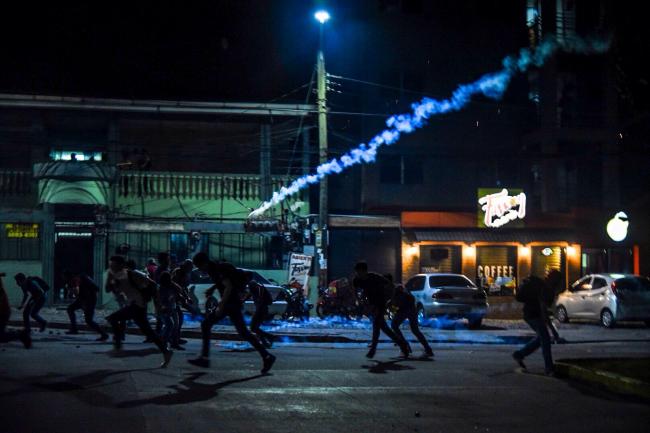
When she was finally able to escape after a senior officer forced the other four to let her go, Melgar got away and hid in a nearby house, where she watched as several hidden patrols of police ambushed a crowd of students as they fled from the initial demonstration, opening fire on them.
“They were able to escape and run,” she said. “But the five patrols caught them afterwards. Not just with teargas. They shot at them with live ammunition.”
Violent crackdowns have become characteristic of the JOH regime. At least 33 were killed by security forces in protests in the weeks of violence following the December 2017 electoral fraud. And many worry as protesters have faced increasingly bloody crackdowns with the creation of special military police units, such as the notorious Policía Militar del Órden Público (Military Police for Public Order, PMOP) in 2013, which was accused of killing protesters in 2017 and 2018. The creation of such special forces—including the U.S.-trained, SWAT-style TIGRES in 2013—exacerbates the human rights situation in a country where the military has patrolled the streets for years and has been accused of death squad activity against anti-government protestors.
“Military policemen are ex-members of the national army. The government created a special course to be able to call them military ‘police,’ and then dispatch them to maintain ‘public order,’” said Mario Argeñal, a leader in COPEMH, Honduras’ largest union, as well as LIBRE. He has been involved in anti-government protests in the 10 years since the coup. “It’s a disguise. It’s the military in the streets. It’s a highly militarized society.”
The Electoral Reform
Honduran democracy, some would say, is already doomed to failure.
But recognizing that doesn’t prevent people like Lenín Laínez, a 24-year-old representative for the LIBRE party, from believing that the best—and the only—way to fight the regime is by working through the corrupted system itself.
Laínez is one of LIBRE’s two diputados for the Intibucá department—the other is Bertha Zúñiga Cáceres, daughter of the murdered environmentalist. He is also the youngest member of Honduras’s National Congress, and speaks glowingly of the electoral reform. He holds faith that the peaceful route of elections and electoral reform can oust JOH. But that faith seems overwhelmed by bitterness over the depth of government corruption. It’s the reason, he says, so many have taken to the streets in often, volcanic displays of anger.
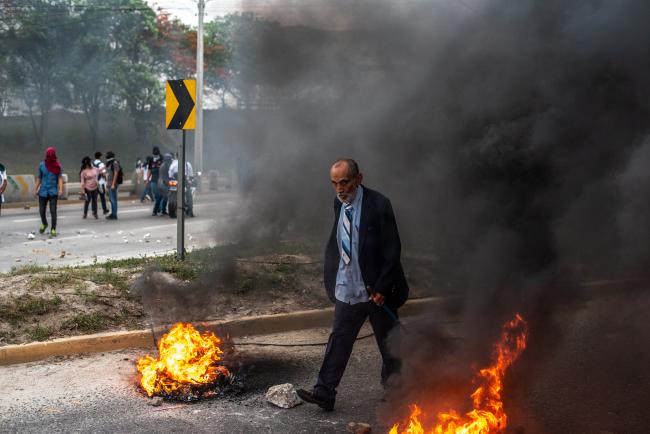
The latest blow came in November and December 2017, when JOH’S conservative Partido Nacionál (National Party) was widely suspected of stealing an election they’d already lost.
For people like Laínez, JOH’s fraudulent 2017 reelection stung particularly deep, not only because a democratic opening was lost, but because it was the latest in a succession of similarly corrupted elections. The opposition alleges JOH already stole the 2013 election from inaugural LIBRE candidate Xiomara Castro, wife of Manuel Zelaya. Salvador Nasrallah, the 2017 candidate for the opposition coalition between LIBRE and other smaller forces, also ran against in 2013 and alleged at the time JOH’s win was illegitimate.
“To participate in an electoral system without transparency is to certify the dictatorship,” said Argeñal of the need for electoral reform.
But he has his doubts about such reform efforts in the first place: He believes that as long as they work within the existing system, they’re still assenting to a regime that has rigged the democracy to its own advantage. For Argeñal, those doubts don’t come from nowhere. Criminal groups with suspected ties to the JOH administration assassinated his brother in 2013 after the electoral fraud took place.
LIBRE has been advocating electoral reform since before the 2017 vote, and European Union election observers have also stressed the need for reforms.
Laínez explained the proposal one evening in Santa Ana, Lainez’s rural home village in the state of Intibucá, watching the moon rise over the nearby mountains of El Salvador. The post-coup regime’s neglect of rural areas is palpable in Santa Ana. Its people are so impoverished that nearly half have left to the U.S. Potholes scar the road so deeply they’re nearly impassable. Now, Salvadoran gangmembers from MS-13—who began crossing the border in 2016 to escape their own government—have occupied several empty houses, killing three villagers in 2018, according to Laínez.
The place is haunted by a revolutionary past: only 10 yards from El Salvador, older residents remember when Salvadoran guerrillas used to pass through the village in the 1980s, ingratiating a mythology of armed struggle into the community. Yet despite revolutionary violence’s perverse allure as a tool for social change, Laínez adamantly rejects the notion of repeating that past.
“Any form of struggle, for us, is good as long as it doesn’t entail violence,” he said. “Any form of struggle. But principally, our objective is to take power through the path of peaceful elections.”
Even so, he’s well aware of the potentially bloody price they’ll have to pay should they fail in that endeavor.
“We’re conscious that if there aren’t electoral reforms, that if the electoral system isn’t cleaned up,” he said, “the next elections will come, and there will be a crisis even uglier than the one we had in 2017. More deaths. More repression.”
On the Verge of Collapse
If fixing Honduran democracy through electoral reform seemed useful after this summer’s protests, it became imperative—or, depending on who you ask, even more futile—after a damning report was released on August 3.
That day, a 44-page document from a U.S. district court seemed to confirm what Hondurans had known intuitively for years: Juan Orlando Hernández had colluded with cartels to illegally secure the 2013 presidential election. No longer could the graffiti scrawled throughout countless Tegucigalpa slums—Fuera, Narco-dictador! (Get out, Narco-dictator!)—be written off as mere hyperbole.
The summer’s second major wave of protests overtook the streets following the revelations, demanding once more that the president resign. And on August 15, 124 out of the 128 seats in the National Congress voted for the “Special Law for the Selection and Appointment of Electoral Authorities and Attributions,” which would stipulate the election of 44 representatives from each party to monitor election processes in 2020. The first major step towards completing a substantial electoral reform, after eight months of deliberations, was completed.
As of August 30, no further progress had yet been made.
“It’s divided between different sectors,” Zelaya said of the opposition to Hernández. “[But] we’re all united in that we want the regime to leave. We want the regime out. We’re telling the regime to get out. Fuera JOH. We’re all united in that 100 percent.”
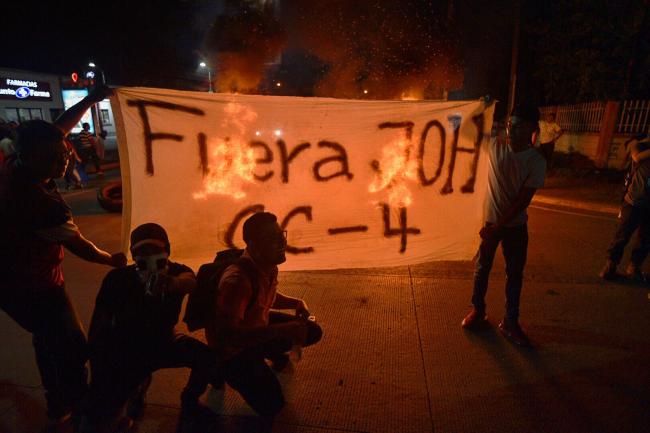
“We can’t call it a dictatorship per se,” said a UNAH student, who asked to remain anonymous for safety reasons, of JOH’s legacy. “But we can call it an authoritarian government…You can see how this is all boiling to a tipping point—how Juan Orlando created a military police; how he’s giving unprecedented power to the military.”
After a few days, the flurry of international press coverage the revelations died off. Media analyst John McEvoy wrote how, because their government is a client regime carrying out neoliberal policies favorable to U.S. companies, Honduran victims are seen as “unworthy victims” in the eyes of mainstream media, as compared to victims of regimes that don’t heel to U.S. interests, such as those in Venezuela. Press coverage was capped with an article in Foreign Policy, which proclaimed that even JOH’s unlikely ouster or extradition wouldn’t change the entrenched problems exacerbated by the violent, post-coup decade. The headline was as straightforward as it was bleak: “Hondurans have little cause for hope.”
Soon after the revelations, with media attention drifting elsewhere, protests against JOH fizzled out with no changes in government; the country had returned to business as usual. Nancy Pelosi visited Honduras on an August 10 state visit, making statements about governance whose perfunctory mildness—“You cannot have security unless you end corruption,” she said—wildly understated the enormity of the accusations against Hernández. Hernández himself visited the Organization of American States in Washington D.C., where he discussed “good practices and technical support in the fight against illegal drug trafficking.”
For Zelaya, any chance of ousting Hernández depends on the fractured opposition’s ability to develop organizational skills greater than those of Hernández’s ruling National Party. “The political future for Honduras depends on the majority of its people’s capacity for political organization,” he said. “The elites are well-organized. The corruption is well-organized. The narcotraffickers are well-organized.”
But Hondurans are well aware of the implications of failing to oust Hernández. Human rights leader Jose Carlos Cárdona believes that, should nothing change, Honduras is on the precipice of a catastrophe unlike any the country has yet experienced.
“You don’t know how these assholes screwed everything,” he said, only a few yards from where the military police opened fire on students at the UNAH. “The level of extreme poverty in Honduras is at four million people…the country is on the verge of collapse. We’re going to collapse at any time. We just need a little flame. And then everything goes to hell.”
Jared Olson is a Pulitzer Center grantee, writer and freelance journalist whose work focuses on the struggle for justice in Central America. He is currently a senior at Flagler College in St. Augustine, Florida, studying international relations and journalism. He can be reached at Jolson455@flagler.edu or at jaredolson.org.

